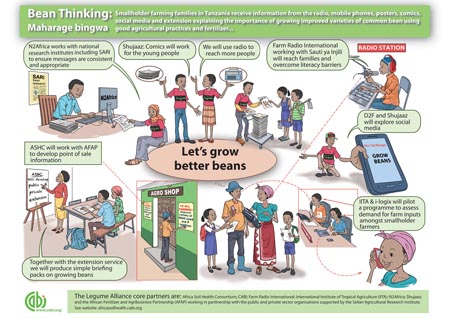|
In early 2015 African Soil Health Consortium helped convene a group that became the Tanzania Legume Alliance. This group is now implementing the campaign called Maharage Bingwa (Champion Beans). The Maharage Bingwa campaign is supporting the dissemination of common bean technologies and practices recommended by the Selian Agricultural Research Institute (SARI) and N2Africa. The Alliance is testing a new integrated approach to developing and sharing agricultural information, initially with common bean technologies. |
|
The Alliance aims to test two hypotheses, central to the ASHC phase 2 approach:
- By targeting smallholder farming families at multiple entry points, with media that appeals to, or reaches younger and older people, men and women, literate and not, we stand the best chance of creating a shared understanding across the generations of new agricultural technologies
- Making sure different age cohorts and demographic groups access messages first hand should create a debate in the family leading to greater levels of adoption of the technology. It also ensures no one-person is responsible for remembering how the technology should be applied thereby making it more likely the technology will be applied correctly.
Multiple media and distribution channels are being used simultaneously, each targeting different members of the farming family, but all with nuanced messages based on consistent, sound science and business principles.
This approach aims to overcome major problems associated with common practice. Usually different organisations in the same locality disseminated subtly different messages. This can confuse farmers which impacts negatively on adoption. Project often selection dissemination approaches without thinking through the impact of the decision.
Choice of media has been shown to have a big impact on who gets access to information – men or women, different age cohorts and people with different literacy levels. Overall the diversity of media approaches means that it is the campaign that is engendered, the constituent materials and approaches are gender neutral.
The campaign involves testing prototypes, pilot materials and dissemination channels. An integrated legume campaign is being rolled out in the run up to, and during, the short rains beginning in October 2015. The emerging lessons will be applied in a scale-up phase campaign in the run up to and during the major planting season, which should start in March 2016. This will see the Alliance bring forward interventions involving groundnut and soyabean.
The Legume Alliance Maharage Bingwa campaign could become a model for future jointly developed and delivered campaigns to help smallholder farming families improve their agricultural practices. The ASHC team will be looking to develop projects in other countries which could include Ethiopia, Ghana, Nigeria and/or Uganda.
The blog for the project can be found at www.africasoilhealth.cabi.org/category/blog.
Duncan Sones, ASHC, Nigeria

